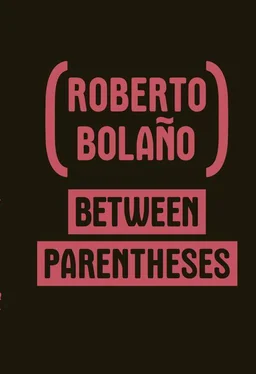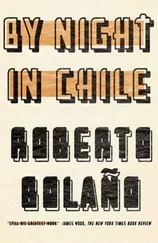Roberto Bolaño - Between Parentheses - Essays, Articles and Speeches, 1998-2003
Здесь есть возможность читать онлайн «Roberto Bolaño - Between Parentheses - Essays, Articles and Speeches, 1998-2003» весь текст электронной книги совершенно бесплатно (целиком полную версию без сокращений). В некоторых случаях можно слушать аудио, скачать через торрент в формате fb2 и присутствует краткое содержание. Год выпуска: 2011, Издательство: New Directions, Жанр: Публицистика, Критика, на английском языке. Описание произведения, (предисловие) а так же отзывы посетителей доступны на портале библиотеки ЛибКат.
- Название:Between Parentheses: Essays, Articles and Speeches, 1998-2003
- Автор:
- Издательство:New Directions
- Жанр:
- Год:2011
- ISBN:нет данных
- Рейтинг книги:4 / 5. Голосов: 1
-
Избранное:Добавить в избранное
- Отзывы:
-
Ваша оценка:
- 80
- 1
- 2
- 3
- 4
- 5
Between Parentheses: Essays, Articles and Speeches, 1998-2003: краткое содержание, описание и аннотация
Предлагаем к чтению аннотацию, описание, краткое содержание или предисловие (зависит от того, что написал сам автор книги «Between Parentheses: Essays, Articles and Speeches, 1998-2003»). Если вы не нашли необходимую информацию о книге — напишите в комментариях, мы постараемся отыскать её.
The Savage Detectives
Between Parenthese
Between Parentheses: Essays, Articles and Speeches, 1998-2003 — читать онлайн бесплатно полную книгу (весь текст) целиком
Ниже представлен текст книги, разбитый по страницам. Система сохранения места последней прочитанной страницы, позволяет с удобством читать онлайн бесплатно книгу «Between Parentheses: Essays, Articles and Speeches, 1998-2003», без необходимости каждый раз заново искать на чём Вы остановились. Поставьте закладку, и сможете в любой момент перейти на страницу, на которой закончили чтение.
Интервал:
Закладка:
We went off down the street, toward Reforma, and a few blocks away we parted. Jim didn’t open his mouth the whole time. I never saw him again.
THE SUICIDE OF GABIREL FERRATER
Countless writers have committed suicide and some of their deaths still retain the original glow, the aura of legend, the blast force or the impact of implosion that so frightened their contemporaries, those who experienced the suicide from up close, because the victim was a friend or a teacher or a colleague, someone they only really noticed at the moment of death. There are suicides that are masterpieces of black humor, like that of the surrealist Jacques Rigaut, or of Jacques Vaché, a forerunner of surrealism. There are suicides that threaten our notion of culture, like that of Walter Benjamin; and others, like that of Hemingway, that seem more like a customs procedure, a long-postponed encounter in an airport.
The suicide of Gabriel Ferrater, one of the best Catalan poets of the second half of the twentieth century, fits the category of cerebral or consciously premeditated suicide, though this in no way means that Ferrater spent his life stroking his own suicide, as other poets stroke their overdeveloped egos. On the contrary, it seems that sometime in his twenties, closer to thirty than twenty, Ferrater decided to kill himself, and he chose the year 1972, a year as ordinary as any other except that it was the year he would turn fifty, a round number and a landmark age. To live past fifty, he decided, was not simply a waste of time but a surrender to the indignities of age.
After that he gave it no further thought, though it’s likely he mentioned it from time to time while out drinking with a few of the younger poets who loved him so much, like Barral and Gil de Biedma. As the fateful date approached but was still very far off, he devoted himself body and soul to reading, translating (Kafka, Chomsky), fucking, drinking, traveling, visiting museums, riding around Barcelona on his motorcycle with quarts of whiskey in his system, making friends, falling in love with very strange women. The photographs we have of him show a generally handsome man, sometimes with the look of a screen actor, white hair, black-framed glasses, turtleneck sweater, hard and intelligent features, lips with a slight (and more than sufficient) sardonic tilt — lips that must have been feared in his day.
He only wrote a few books of poems. Three, if I remember correctly. All incomparable. In any case, Ferrater lived his life — and wrote his poems — like a Roman. When at last the year 1972 came and he turned fifty, he stepped forth to meet his fate and killed himself, in Sant Cugat del Vallès, a little town near Barcelona. No one found it strange.
RODRIGO REY ROSA IN MALI (I THINK)
It might be a good idea to discuss Rey Rosa’s latest books, the book about India and his most recent novel, a little gem that takes a new angle on the noir, a genre in which many try to make their mark and few succeed. To say that Rodrigo Rey Rosa is the most rigorous writer of my generation and at the same time the most transparent, the best crafter of stories and the brightest star, is to say nothing new.
Today I would rather remember a story that he told me. The story is about a trip to an African country — Mali, I think, though I can’t be sure. In any case, Rey Rosa flies into the capital, a chaotic city near the coast. After spending a few days there he travels by bus to a town in the interior. There the road ends, or perhaps it instead becomes uncertain, like a desert track that a gust of wind could erase.
The town is near a river and Rey Rosa takes a boat that sails interminably upstream. Finally he reaches a village, and after walking around and talking to people, he comes to a house, a one-room brick house, which is where he was heading. The house — which belongs to a Mallorcan painter, probably one of the best contemporary painters — is empty. In it there’s a chest and in that chest, safe from termites, are the painter’s books. That night Rey Rosa reads until late, by candlelight, because of course there’s no electricity. Then he covers himself with a blanket and goes to sleep.
For a few days he stays at the village, which hardly has enough huts to deserve the name. He buys food from the locals, drinks tea by the river, takes long walks to the edge of the desert. One day he finishes the book he’s borrowed from the by now legendary chest and then he puts it back, locks up the house, and leaves. Anyone else would have started back immediately. Rey Rosa, however, leaves the village by the back door, as you might say, and heads for the mountains instead of the river. I’ve forgotten what they’re called. All I know is that at dusk they take on a bluish tinge that gradually shades from pale to metallic blue. Darkness falls, of course, as he walks in the desert and that night he sleeps among the wild things.
The next day he sets out again. And so it goes, until he reaches the mountains, which cradle small barren valleys, where the sea of sand is wearing away the rocks. He spends yet another night there. Then he returns to the village, the river, the town, the bus, the capital, and the plane that carries him back to Paris, where he was living at the time.
When he told me the story, I said that a trip like that would kill me. Rodrigo Rey Rosa — who believes in life as only children and those who’ve felt the presence of death can — replied that it was nothing.
A FEW WORDS FOR ENRIQUE LIHN
He was without a doubt the best poet of his generation, the so-called Generación del ’50, and one of the three or four best Latin American poets born between 1925 and 1935. Or maybe one of the two best. Or maybe he was the best. But at the beginning of the twenty-first century, that doesn’t mean much.
In my adolescence, to talk about Lihn and Teillier as opposing choices was commonplace. The sensitive kids, those who didn’t want to grow up (or those who wanted to grow up as fast as possible), preferred Teillier. Those who were prepared to argue the point preferred Lihn. This wasn’t the least of his virtues. To read much of his poetry is to encounter a voice that questions everything. But it isn’t the voice of hell, or of millenarian prophecies, or even a prophetic ego, but the voice of the enlightened citizen, a citizen who awaits the arrival of modernism or who is resignedly modern. A citizen who has learned at the feet of Parra, Lihn’s teacher and fellow prankster, and whose Latin American vision is often dazzling and original. But all the dazzle in Lihn is modulated by a constant exercise of intelligence. In the 1970s, that clarity would cause him to be stigmatized and declared anathema by the dogmatic and neo-Stalinist left, which would even go so far as to accuse him of connivance with Pinochetism. The same people who back then didn’t speak up to defend Reinaldo Arenas and who today adapt themselves like Putins¶ to the new situation, tried to wipe him from the map, to delegitimize a voice that had always considered itself a bastard voice, a child at the mercy of fate and necessity, a lone rider.
Are we Chileans deserving of Lihn? This is a pointless question, something he would never have asked himself. I think we are. Not really, not entirely, but we are deserving of him, even if only because of the pure souls, the idiot princes, and the cheerful illiterates who the country once produced with such strange generosity and who are still being produced today, or so one hears from those who’ve been there recently, though in more limited quantities. In a certain light, Lihn himself could pass for an idiot prince and a cheerful illiterate.
As a writer of poetry, to which he was always faithful, there’s only one poet in the Spanish language to whom he can be compared, Jaime Gil de Biedma, though Lihn’s range of tone is much wider. As a writer of essays, reviews, manifestos, and even libel, no Chilean writer was ever more free or unerring. In fiction he never reached the heights of Donoso or Edwards, though the suspicion will always linger that deep down, like all of Chile’s great poets, he judged the art of fiction as something unnecessary, something short of life-saving.
Читать дальшеИнтервал:
Закладка:
Похожие книги на «Between Parentheses: Essays, Articles and Speeches, 1998-2003»
Представляем Вашему вниманию похожие книги на «Between Parentheses: Essays, Articles and Speeches, 1998-2003» списком для выбора. Мы отобрали схожую по названию и смыслу литературу в надежде предоставить читателям больше вариантов отыскать новые, интересные, ещё непрочитанные произведения.
Обсуждение, отзывы о книге «Between Parentheses: Essays, Articles and Speeches, 1998-2003» и просто собственные мнения читателей. Оставьте ваши комментарии, напишите, что Вы думаете о произведении, его смысле или главных героях. Укажите что конкретно понравилось, а что нет, и почему Вы так считаете.












